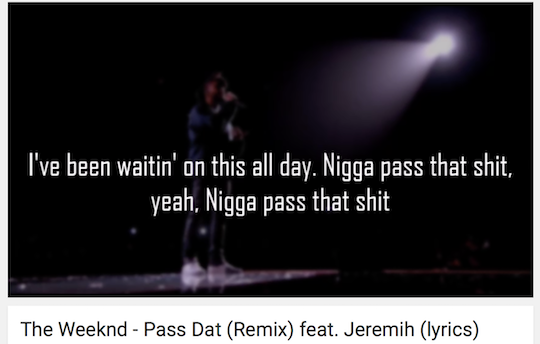Reclaiming the n-word has been one of the few successful projects of our lifetime, and most of the thanks belongs to hip hop. The n-word used to be a word white people said to black people. Now it is a word black people say to one another, while white people hope silently that a black person will say it to them. This situation is better in all regards—except, ironically, for hip hop. The prevalence of the n-word in rap poses a major problem to its largest audience demographic, white people between the ages of 18 and 35. Now that the work of reclamation has been achieved, we should agree to replace the n-word in music with the word “Inca,” so that when we are rapping along with “Pass Dat,” we don’t have to choose between saying the n-word fifty times and delivering an inferior performance.
Agreed that the n-word has been extremely useful to rap so far. It is easy to say, if you’ve been practicing. It rhymes well. Most importantly, it offers two accented syllables with a glottal stop at the end, which allows it to fit in places other words do not.
For example, the n-word is utterly essential to “Pass Dat.” The opening quatrain is easy enough without it:
Blunt after blunt after blunt after blunt
after blunt after blunt, hey.
Cup after cup, gotta double that up.
I’ve been waitin’ on this all day.
You can sing that quietly to yourself over dinner, waiting in line at the Starbucks, wherever. But the next part, “[n-word] pass that shit (x 4)” is virtually impossible without saying the actual n-word. Nothing else fits.
Saying “n-word” doesn’t work, even though they are both theoretically the same length. The novice might think rap is a game of counting syllables, and it’s true raps are written that way for car commercials across America. But the sophisticated, experienced rapper—one who has rapped in the shower for years, maybe even decades—knows that not all syllables are created equal.
“Word,” for example, is one of the longest syllables in the English language, which is why early rappers made sure to put it at the end. The “en” sound is also tricky. To ask the rapper to replace the n-word with “n-word” is to ask him to plug his nose and mouth before uttering an especially long word, all in the time it takes Jeremih to catch the attention of the fellow on his right.
Other substitute words don’t work any better. Saying a word that sounds similar, such as “nickel,” incurs most of the same risks as saying the n-word. “Negro” feels almost as bad and is harder to wedge in. “Hipster”—the closest thing white people have to an n-word of their own—is impossible.
But “Inca” takes almost exactly the same amount of time to say as the n-word, I am told. It offers the same glottal stop. It produces assonance and consonance in many of the same contexts, but—and this is very important—it does not start with “ni” or end with “ga/ger.” Reversing the vowel and consonant sounds of the first syllable clearly distinguishes “Inca” from the n-word while preserving its musical function, the way editing has made “ish” a substitute for “shit.”
The utility of this policy is not limited to “Pass Dat.” You can say “Inca” in place of the n-word in all sorts of contexts, for example in the lowrider sketch before Dr. Dre’s “The Watcher”. Go ahead and shout “Inca that’s Dre!” as loudly as you want. Just make sure the windows are rolled up, in case someone mishears you.
It’s important to note that this policy will not offend Incas—both because “Inca” is not a derogatory term, and because most people who identify as Inca speak Spanish, so the words we use in rap mean nothing to them. The n-word is the only one they do know. Trust me, they’ll be thrilled by the switch.
Once we make this change, we can all enjoy hip hop. Your grandmother, trained from an early age to only say the n-word at home with family, can now rap freely along with Jay-Z’s “[Inca] Please” on her way to the beauty parlor. Action Bronson will take one more step toward leveling the field with Ghostface. And Michael Richards can safely return to stand-up comedy, knowing the odds of being heckled by an Inca are extremely low.
Like any broad societal change, this one will take time. But it’s worth it. The alternative would be to keep using a word that excludes people, that makes them feel unwelcome in their own culture, that sends the message that the vibrant America in which they so meaningfully participate is not for them. And really, how unfair would that be?





Highlight: “It is easy to say, if you’ve been practicing.”
Try “neighbor.”
Damn it feels good to be a gangsta
A real gangsta-ass Inca plays his cards right
A real gangsta-ass Inca never runs his fucking mouth
Cause real gangsta-ass Incas don’t start fights
And Incas always gotta high cap
Showing all his boys how he shot em
But real gangsta-ass Incas don’t flex nuts
Cause real gangsta-ass Incas know they got em
Ehh…
The strangest things can happen from rappin’
When Incas get wrapped up in image and actin.’
Incas get capped up and wrapped in plastic
Zipped up in bags, when it happens that’s it.
problems arise in certain repeat situations, however. For example, in Gucci Mane’s “classical”
“I say it two times
inca inca stop lying”
I’m not sure what a linguist would call it, but when saying inca twice I feel like I’m talking uphill, Gucci really leans into the ‘n-n’ in that song, to exhilarating effect.
Pizarro: clearly not messing with a broke Inca.